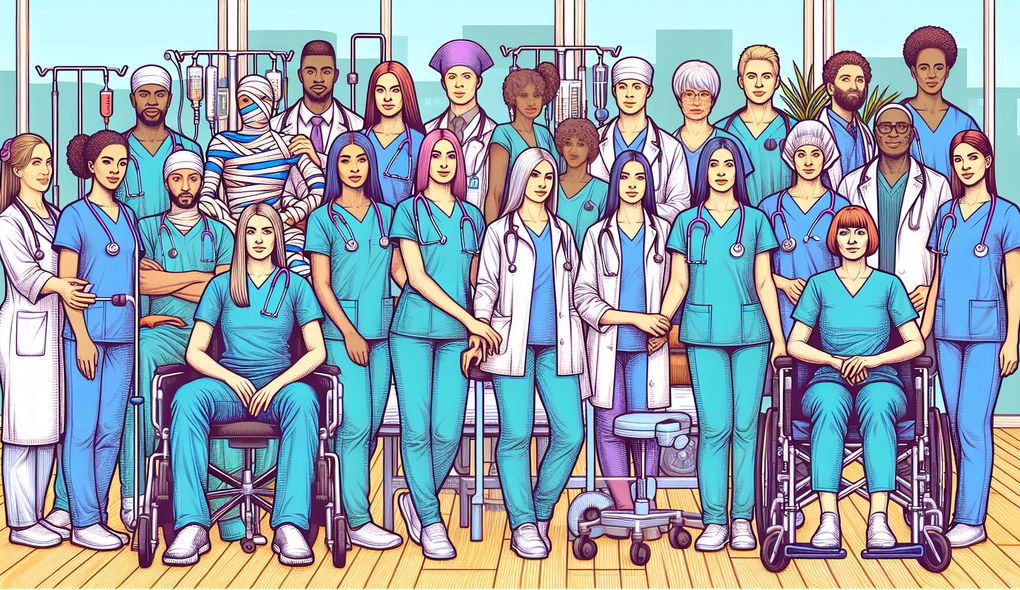How do you collaborate with a multi-disciplinary healthcare team to provide coordinated care for patients?
JUNIOR LEVEL

Sample answer to the question:
In my previous role as a Rehabilitation Nurse Practitioner, I collaborated with a multi-disciplinary healthcare team to provide coordinated care for patients. We would have regular team meetings where we discussed each patient's case, including their medical history and rehabilitation goals. I would contribute my expertise in rehabilitation practice and principles to help develop individualized care plans. We would also communicate regularly through electronic health records (EHR) systems to ensure everyone was up to date on the patient's progress. I would provide emotional support and advocacy for patients throughout the rehabilitation process, and make adjustments to their treatment plans as necessary. Overall, my ability to work effectively in a multi-disciplinary team allowed us to provide comprehensive and coordinated care for our patients.
Here is a more solid answer:
As a Rehabilitation Nurse Practitioner, I understand the importance of collaborating with a multi-disciplinary healthcare team to provide coordinated care for patients. In my previous role, I worked closely with physical therapists, occupational therapists, speech therapists, and social workers to develop and implement individualized care plans. We would regularly meet to discuss each patient's case, sharing information about their medical history, rehabilitation goals, and progress. I would contribute my strong clinical skills and knowledge of healthcare in a rehabilitation setting to ensure the care plans were evidence-based and effective. Communication was key, and I would actively engage with team members to exchange information, ask for feedback, and coordinate treatment interventions. I also made sure to document all patient-related information accurately and efficiently using electronic health records (EHR) systems. By working collaboratively, we were able to provide comprehensive care that addressed the physical, emotional, and social needs of our patients and facilitated their maximum level of independence and wellness.
Why is this a more solid answer?
The solid answer provides specific details and examples of collaborating with a multi-disciplinary healthcare team and highlights how the candidate's skills and knowledge contribute to the coordinated care of patients. It addresses all the evaluation areas from the job description, but it can still be improved by including more specific examples of how the candidate demonstrates each skill.
An example of a exceptional answer:
Collaborating with a multi-disciplinary healthcare team to provide coordinated care for patients is an essential part of my role as a Rehabilitation Nurse Practitioner. In my previous position, I actively engaged with the team of physical therapists, occupational therapists, speech therapists, and social workers to ensure a holistic approach to patient care. For example, when developing individualized care plans, we would consider not only the patient's medical history and rehabilitation goals but also their personal preferences, cultural background, and social support system. This comprehensive approach helped us tailor the treatment interventions to meet the unique needs of each patient. In team meetings, I would present my assessment findings, treatment recommendations, and progress updates, actively seeking feedback and input from the team. I would also take the initiative to educate myself about the expertise and roles of other team members, recognizing the value of their contributions and fostering effective collaboration. Additionally, I consistently documented all patient information accurately and promptly using electronic health records (EHR) systems, ensuring the continuity of care across different healthcare settings. By collaborating closely with the multi-disciplinary team, we were able to provide coordinated care that promoted the patients' maximum level of independence and wellness.
Why is this an exceptional answer?
The exceptional answer provides specific examples and demonstrates a deep understanding of collaboration with a multi-disciplinary healthcare team. The candidate goes beyond the basic requirements and highlights their ability to consider various factors, such as personal preferences, cultural background, and social support, in the care plans. They also emphasize their proactiveness in seeking feedback and learning from other team members. The exceptional answer fully addresses all the evaluation areas from the job description and showcases the candidate's comprehensive approach to providing coordinated care for patients.
How to prepare for this question:
- Familiarize yourself with the roles and expertise of different healthcare professionals involved in a multi-disciplinary team. Understand how they contribute to the care of patients with physical disabilities or chronic illnesses.
- Reflect on your past experiences collaborating with a team in a healthcare setting. Think about specific examples where you demonstrated excellent communication and interpersonal skills, attention to detail in developing and following through on treatment plans, and compassion and sensitivity to patients' needs.
- Practice discussing how you utilize electronic health records (EHR) systems efficiently and accurately to maintain patient records and facilitate communication within the team.
- Consider the importance of organizational and time management skills in coordinating care for patients. Think about how you prioritize tasks, manage your time effectively, and ensure the smooth flow of patient care.
- Research and stay updated on the latest advancements and evidence-based practices in rehabilitation nursing. This will demonstrate your commitment to providing high-quality care as part of a multi-disciplinary team.
What are interviewers evaluating with this question?
- Strong clinical skills and knowledge of healthcare in a rehabilitation setting
- Excellent communication and interpersonal skills
- Ability to develop and follow through on a treatment plan with attention to detail
- Compassion and sensitivity to the needs of patients with disabilities or chronic illnesses
- Good organizational and time management skills
- Proficient in electronic health records (EHR) systems

